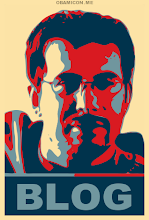 LFR'S PERSONS OF THE YEAR: THE VOTERS OF IOWA
LFR'S PERSONS OF THE YEAR: THE VOTERS OF IOWATwo thousand-eight will be go down as the year of Barack Obama. No publication in their right mind would argue with this assessment, but the end of eight years of partisan bickering under President Bush began in earnest during a snowy January night when the caucus-goers of Iowa proved that a black man could indeed become President of the United States. For this act of political bravery and vision the voters of Iowa are the LFR Persons of the Year.
Back in October of last year, the inevitability of Sen. Hillary Clinton's run to the White House began to decrease with reports of disarray in her Iowa campaign staff. The LFR wondered at this time whether Clinton might finish third in the Jan. 3 caucus--she did--but, it was not John Edwards who reaped the rewards, instead Obama easily won the nation's first contest and set the tone for the rest of the campaign season in the name of slogans such as "change we can believe in" and "Yes we can".
It wasn't just that Obama outsmarted Clinton on the ground in Iowa; this was expected. The Clintons going back to 1992 never engaged the voters of Iowa like they did in New Hampshire. President Clinton deferred to native son Sen. Tom Harkin in 1992 and ran unopposed in 1996. The sound of change, though, rang like a clarion call to voters unwilling to believe Obama could actually win the presidency when a Midwestern state featuring demographics of 92 percent whites threw up their arms in despair over the damage wrought by Republican rule and unequivocally set forth the rise of Obama on America. He would be upset in New Hampshire by a Clinton comeback but 13 straight victories along with the momentum it achieved became an unstoppable force for Clinton and ultimately the Republican challenger--Sen. John McCain.
Here's a sampling of the commentary from early January:
Arianna Huffington of the Huffington Post said, "Because tonight voters decided that they didn't want to look back. They wanted to look into the future -- as if a country exhausted by the last seven years wanted to recapture its youth."
Ed Morrisey at the Captain's Quarters wrote, "Obama beat Hillary in a state that has a very small African-American demographic; he won not by playing the race card, but by simply offering a departure from Clintonian politics."
Philadelphia Inquirer columnist Dick Polman seemed to be reading into the future saying, "He’s the 'change' candidate unless and until somebody else swipes the label. That won’t be easy, because now he looks like the leader of a burgeoning movement, and that’s catnip for independents and non-establishment Democrats who have long yearned to shake things up."
A diarist at Daily Kos makes the most illuminating point of all, "Tonight we saw the the core of a future progressive majority make its presence known in Democratic politics. Young Voters are not a hidden vote or icing on the cake, and after tonight, everyone knows it. "
It is easy to forget where this all started before voters in Iowa met in cramped high school gyms and clammy Elk's Lodges to thrust the candidacy of Obama towards its destiny almost exactly 11 months later. Obama was a likable, handsome candidate who could spin one hell of a speech, but until Iowa these attributes did not make a serious candidate.
The roots of Obama's successful campaign first spread in Iowa. His attention to unifying the country. The decision to never make race an issue. His ability to rally the youth and his use of sophisticated web tools such as emailing, text-messaging and grassroots organizing captured the mood of Iowans and later the entire country.
It is likely that historians will look kindly on Jan. 3, 2008 as the day America began to heal and the nation is indebted to the people of Iowa.


